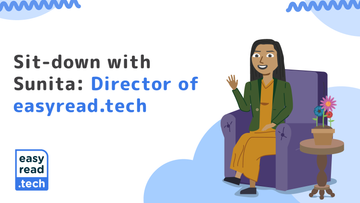Sit-down with Sunita: Director of easyread.tech

After the success of the launch of easyread.tech, I sat down with Director, Sunita Miranda, to learn more about her and the journey of the organisation.
So, Sunita, please introduce yourself, let us know a bit about who you are and what you do.
Hi, my name is Sunita and I am a communications and marketing professional, with over 20 years of experience, across many industries, but my favourite has been human services - particularly multicultural communications and disability communications. I’m a community-minded person who thrives in a social setting and have always looked to engage with people, either through my work or in my personal life.Why did you decide to start up easyread.tech?
Having worked in communications relating to vulnerable people and communities, the gaps in accessibility soon became quite evident, and I felt like I had a responsibility to make things better when the opportunity presented itself. Through our marketing, communications and creative agency, Cornerstone Alliance, we were able to bootstrap easyread.tech, which is a South Australian startup.
Easyread.tech offers organisations a complete end-to-end service that transforms complex information into comprehensible information designed for consumption by people with cognitive disability, cognitive decline, or those with low literacy. Easyread.tech also has a library of custom-developed illustrations that anyone can purchase at a low cost and use within their resources.
The vision is to see Australia start to improve its practice broadly when communicating with vulnerable people. With the support of an incredibly talented team, the illustrations library became a reality and the website now allows for anyone to be able to access them and build their own accessible resources.
What motivates you to work in this area of inclusive marketing and communications and the disability sector?
The disability sector is a space where I feel there is no nonsense, almost everyone is really trying to do the right thing, and is generally altruistic. That aligns with my own values and purpose-driven life and career choices.
Why should people care about inclusive information?
Well, it’s hardly about ‘just caring’. It’s more important to consider catering to the whole rather than a part of Australian society. We have almost 50% of our people who have a multicultural connection, and one-in-five Australians living with a disability. These demographics need attention and it’s well and truly time to get serious about including the whole demographic and cater to everyone’s comprehensibility. That means developing resources in Easy Read for people with disabilities or people with ageing-related cognitive decline, or Plain English formats for people with low literacy, such as migrants and refugees.
What change would you like to see easyread.tech make?
The aspiration is to see communications designed for people with disability or low literacy become more effective, more engaging, and more beautiful. The hope is that everyone begins to consider inclusive communications in their broader communications strategy. The vision is that people with disability and low literacy feel completely included and are able to access information and messaging.
Where do you envision easyread.tech heading, let’s say, five years from now?
I would love to see easyread.tech being a positive contributor in raising the standard of accessible communications in Australia. I would be delighted to see people with disabilities, and people from refugee and migrant backgrounds interact more with us and become part of the easyread.tech community as we grow into a social enterprise.
What advice would you give to people and organisations interested in promoting inclusive information and making their content more accessible?
Begin with the why. Once you are informed about the reasons why accessible and inclusive communications would benefit your organisation and its stakeholders, proceed to the How. There are many ways you can improve and embed best-practices within your communications strategy – we are happy to help with planning and developing these resources for you. If you have staff trained in developing accessible resources, you may find our illustrations library useful to augment comprehension of your simplified messaging. These illustrations have been custom-designed here in South Australia by our designers who have researched each concept before developing characters and activities.
Reach out to the team at easyread.tech to start your organisation's journey in making information and communications more accessible and inclusive.
